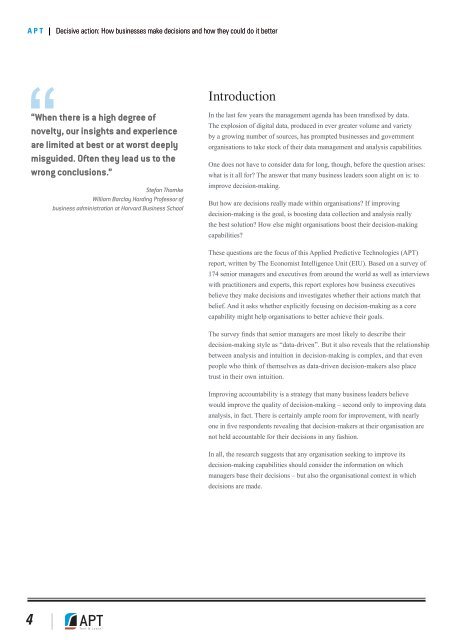Decisive Action - How businesses make decisions
Decisive Action - How businesses make decisions
Decisive Action - How businesses make decisions
Create successful ePaper yourself
Turn your PDF publications into a flip-book with our unique Google optimized e-Paper software.
APT | <strong>Decisive</strong> action: <strong>How</strong> <strong>businesses</strong> <strong>make</strong> <strong>decisions</strong> and how they could do it betterIntroduction“When there is a high degree ofnovelty, our insights and experienceare limited at best or at worst deeplymisguided. Often they lead us to thewrong conclusions.”Stefan ThomkeWilliam Barclay Harding Professor ofbusiness administration at Harvard Business SchoolIn the last few years the management agenda has been transfixed by data.The explosion of digital data, produced in ever greater volume and varietyby a growing number of sources, has prompted <strong>businesses</strong> and governmentorganisations to take stock of their data management and analysis capabilities.One does not have to consider data for long, though, before the question arises:what is it all for? The answer that many business leaders soon alight on is: toimprove decision-making.But how are <strong>decisions</strong> really made within organisations? If improvingdecision-making is the goal, is boosting data collection and analysis reallythe best solution? <strong>How</strong> else might organisations boost their decision-makingcapabilities?These questions are the focus of this Applied Predictive Technologies (APT)report, written by The Economist Intelligence Unit (EIU). Based on a survey of174 senior managers and executives from around the world as well as interviewswith practitioners and experts, this report explores how business executivesbelieve they <strong>make</strong> <strong>decisions</strong> and investigates whether their actions match thatbelief. And it asks whether explicitly focusing on decision-making as a corecapability might help organisations to better achieve their goals.The survey finds that senior managers are most likely to describe theirdecision-making style as “data-driven”. But it also reveals that the relationshipbetween analysis and intuition in decision-making is complex, and that evenpeople who think of themselves as data-driven decision-<strong>make</strong>rs also placetrust in their own intuition.Improving accountability is a strategy that many business leaders believewould improve the quality of decision-making – second only to improving dataanalysis, in fact. There is certainly ample room for improvement, with nearlyone in five respondents revealing that decision-<strong>make</strong>rs at their organisation arenot held accountable for their <strong>decisions</strong> in any fashion.In all, the research suggests that any organisation seeking to improve itsdecision-making capabilities should consider the information on whichmanagers base their <strong>decisions</strong> – but also the organisational context in which<strong>decisions</strong> are made.4


